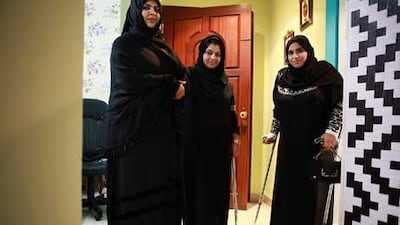ABU DHABI // Serving as guide, mentor and friend, Mariam Al Ahmadi established her special needs committee with a single goal - to support individuals with special needs and help them contribute to the country's progress.
The group started in 2006 with just one member, and has since grown to include 24. It is not official or licensed, just a collection of volunteers who meet weekly and work on projects that would benefit the special needs community, but Ms Al Ahmadi hopes to establish it as an official special needs association - with current members serving on the board - in the next year.
"These individuals are so intelligent," she said. "Many of them are educated, they've got bachelor's degrees, PhD's and masters. But they not only want to study, they also want to be a part of society. They want to attend conferences, travel and reaffirm their place in the community."
When Ms al Ahmadi launched the group, while working as the chair of the Emirates Human Rights Association labour committee, she said friends and family discouraged her aspirations.
"They would tell me 'you're wasting your time'. They didn't understand the concept of volunteering or working for free."
Little did they know financial rewards were the furthest thing from Ms al Ahmadi's mind. But with time, Ms Al Ahmadi's loved ones understood the value of her work.
Raised in a modest family and an only child, she credits her passion for others to growing up without siblings.
Through her participation in other programmes and initiatives, such as the Environment Friends Society and the Saaed Association for Prevention of Traffic Crashes, Ms al Ahmadi works to bring the members of her committee to the forefront of community activities - and to ease the more challenging path they trod in daily life.
She counts among her successful efforts convincing courts to develop a marriage contract in braille, as well as raising money to provide the blind members of her committee with voice-activated calculators.
Mariam al Ali, a long-time friend of Ms al Ahmadi, said she chose to join the committee in order to prove her abilities to society. Ms Ali, who is blind, did not let her disability get in the way of her ambitions.
Now 29 and a successful lawyer at the Ministry of Justice, she hopes to be a role model for others.
"Their voices can be heard through us," she said. "Maybe when they see us taking a step forward, they'll find the courage to do so as well."
One area where significant improvement is necessary, they said, is in the education system.
"Many people with disabilities don't make it beyond secondary school," Ms Ali said. "And it is not because they don't have the mental capacity. It is because there is a lack of support for these people in schools."
Significant improvement is also needed in helping people with special needs find meaningful work and fulfilling careers.
When she was just a toddler Aisha Esa, from Abu Dhabi, was diagnosed with polio, which caused semi-paralysis in her legs. Although she graduated with a degree in physiology at UAE University, Ms Esa, 43, has yet to obtain a job in her field of study.
"A majority of those with special needs are given administrative jobs, they'll be secretaries or work as receptionists," she said. "We need more opportunities to pursue professional jobs, ones with potential for growth."
Even basic needs, such as special medical equipment and supplies, can often seem inaccessible, Ms Esa said.
"I first had to walk with crutches that were extremely uncomfortable and I had to travel to Saudi Arabia to find the ones I needed," she said. "Even for the shoes I need to wear, I either have to make a special order from abroad, which takes time, or I have to wait until I travel.
"These are basic necessities that should be available in the market. In fact, they should be manufactured here in the UAE."
The special needs committee is currently trying to raise money to purchase equipment, including wheelchairs and crutches, needed by members of the community.
"I travelled around the GCC to try and get this equipment, but even then - it's not the exact ones they need," said Ms Al Ahmadi. "It's really tough, we're trying to find companies to sponsor us."
Besides the physical issues, there are also social challenges to overcome.
The emergence of organisations such as Tamkeen, a not-for-profit that aims to empower the visually impaired through training, support and counseling, as well as various special needs centres throughout the country, have brought the UAE a significant step forward in providing these individuals with the support they need.
"The country has come a long way, and I'm grateful," Ms al Ali said. "But there is always an opportunity to progress, and we should strive for it."
mismail@thenational.ae

Special needs committee gives support and encouragement
Mariam Al Ahmadi serves as mentor, coach and cheerleader for the special needs committee she heads.
Most popular today
4
